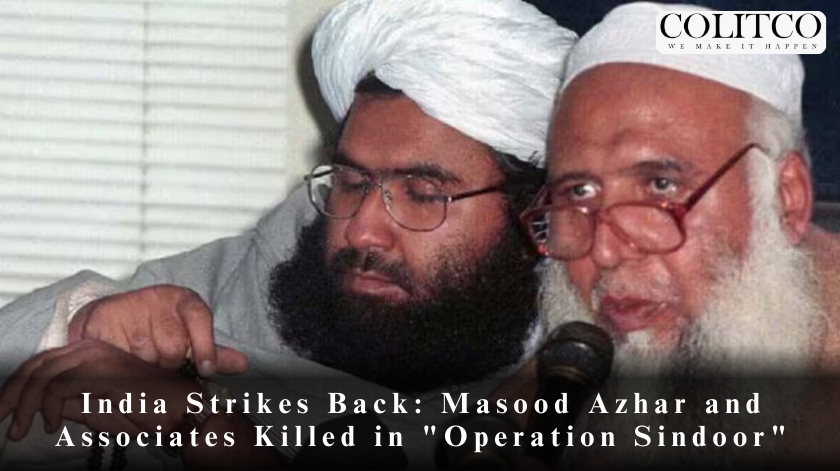In a bold retaliation following the militant attack in Baisaran Valley, Pahalgam, India has launched a decisive military operation, codenamed “Operation Sindoor.” The operation specifically targeted the leader of the Jaish-e-Mohammed group, Masood Azhar, and his associates, leading to the death of Azhar and four of his key associates.
This operation comes on the heels of an attack in April, which left several tourists dead at the hands of militants in the region. “Operation Sindoor” was named as a tribute to the wives of the victims who lost their lives in that tragic attack, reflecting India’s ongoing commitment to avenging the loss of innocent lives.
Prime Minister Modi Cancels Europe Visit
In the wake of the escalating tensions, Prime Minister Narendra Modi has made a dramatic decision to cancel his planned visit to Europe. The cancellation comes as India takes swift action to ensure national security, reflecting the gravity of the situation and the government’s prioritization of military responses over international diplomacy.
Global Reactions to the India-Pakistan Tensions
The escalating conflict has prompted an array of international responses. China called for calm, urging India and Pakistan to “prioritize peace and stability” and to avoid actions that could worsen the situation. Both countries have long-standing tensions over the Kashmir region, with the international community fearing further destabilization of the region.
Russia has voiced concerns about the developing situation, while Turkey called for “common sense” to guide both nations toward peaceful negotiations. The UK has similarly urged both countries to avoid further escalation, with Foreign Secretary David Lammy reiterating Britain’s position: “If this escalates further, nobody wins.”
Also Read: Bruins Eye Jake O’Brien with No. 7 Pick After NHL Draft Lottery Slide
The United Kingdom has offered its assistance in facilitating dialogue between the two nations to de-escalate tensions, emphasizing the need for restraint and a diplomatic resolution to the conflict.
Flights Disrupted Across the Region
The geopolitical crisis has resulted in significant disruptions to air travel. Commercial airlines have been forced to reroute or cancel flights to avoid Pakistan’s airspace, impacting numerous international and domestic journeys. The airspace closure has further complicated an already tense situation and added economic strain in the region.
Since India carried out its strikes early on Wednesday morning, heavy artillery fire has been reported by locals living along the Line of Control (LoC), the de facto border that divides the disputed region of Kashmir.
Indian officials said that at least 12 civilians had been killed in the shelling since Wednesday morning, with 42 others injured. The victims included a woman and her three children. Thousands of residents living near the LoC were forced to evacuate to safer areas.
Poonch, located in the south-west of Indian-administered Kashmir near the Line of Control, suffered the heaviest damage from the shelling. Local residents described living in terror amid what they called a “rain of artillery fire” that damaged homes, a Sikh temple, agricultural fields, and vehicles.
“I’m confined to a concrete bunker in my basement with six family members,” Abdullah Khan said by phone. “Mortar shells have been landing around us since last night. While many have managed to flee to safer areas, we haven’t found an opportunity to escape.”
The shelling has devastated Poonch town, with multiple locations hit, according to local residents. Although cross-border firing along the LoC has continued for 13 days, witnesses reported intensification following India’s military strike against Pakistan.
“Two of my relatives were seriously wounded when a mortar shell hit their home this morning,” said Safeer Abdullah, a Poonch resident who expressed anger over rising India-Pakistan tensions. “We’ve endured this violence for generations; our ancestors suffered, and now we do too. Every hour here feels like it could be our last. The shelling has been so intense that no one within 150 kilometers of the border can sleep or eat properly.”
Mohammad Mashooq, another Poonch resident, reported that numerous homes had been destroyed and warned the entire town could burn if shelling persists.
“We beg the Indian and Pakistani governments to stop this madness,” Mashooq said by phone, with artillery explosions audible in the background. “Innocent people are being brutally killed. They should let us live in peace – there’s been enough destruction and loss of life.”
As he prepared his family for another perilous night in their bunker, Mashooq added: “My children are terrified. I fear these earth-shaking explosions might kill them. I just hope we survive this hell tonight.”
Kashmir: A Long-standing Dispute
Kashmir has been a disputed region between India and Pakistan since the partition of British India in 1947. Over the years, it has become a focal point of military and political tension, and the recent escalation has once again brought the region into the international spotlight.
Spain Calls for Restraint in Escalating Crisis
In a statement, the Spanish foreign ministry called for restraint to avoid any military escalation between India and Pakistan. It read:
The minister of foreign affairs, European Union, and cooperation, José Manuel Albares, held talks with his counterparts from India, Subrahmanyam Jaishankar, and from Pakistan, Ishaq Dar, to learn first-hand about the situation that has developed in recent hours and to exchange views with both sides.
Albares called for restraint to avoid any military escalation and urged dialogue and diplomacy to resolve differences. The Spanish minister also offered Spain’s mediation to facilitate bilateral dialogue or a dialogue within the framework of the United Nations.
As the situation continues to evolve, the world watches closely, with diplomatic efforts intensifying to prevent further bloodshed and ensure peace in the region.












